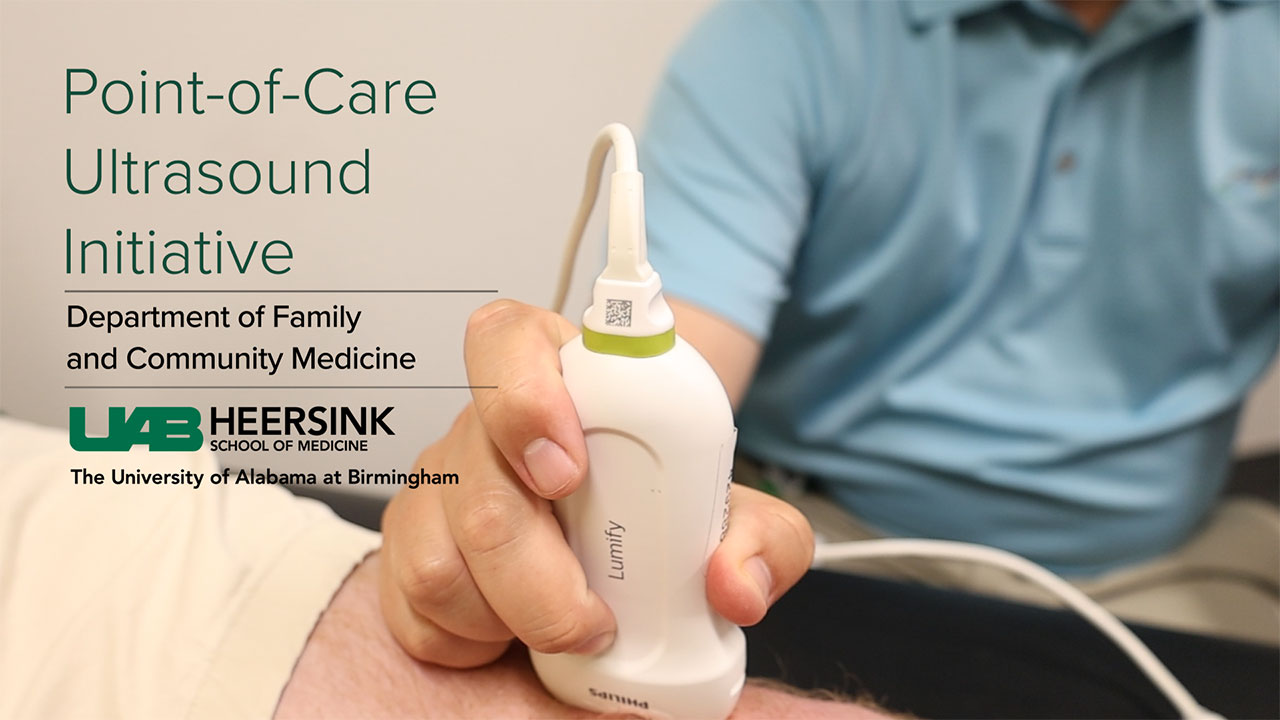
The UAB Department of Family and Community Medicine launches its Point-of-Care Ultrasound (POCUS) Initiative this semester, using $2 million in federal grant funds to give every student in the UAB Marnix E. Heersink School of Medicine access to point-of-care ultrasound, or POCUS, units.
Currently, the department is in the process of distributing 600 devices for use by UAB students, as well as 100 devices for community preceptors who welcome learners into their clinics.
Beginning their first semester, students will learn how to use the devices to evaluate every major organ system, diagnose injury or disease and perform procedures. They will see POCUS applied in a variety of settings, from hospitals to sports sidelines to primary care clinics, and will learn how the palm-sized devices, which allow providers to quickly and easily conduct ultrasound scans, can make high-quality medical care accessible for all patients, particularly those in rural and underserved areas.
The initiative is supported by the department’s Comprehensive Urban Underserved and Rural Experience, or CU2RE, program, funded by the Health Resources and Services Administration to recruit, train and retain excellent primary care physicians committed to serving in rural and urban underserved areas of Alabama.
Projections show that Alabama will need 612 new primary care physicians by 2030 just to maintain the status quo, and many patients in rural and urban underserved areas already face significant wait times for appointments or have to travel long distances for medical care. Point-of-care ultrasound can play an important role in addressing these shortages by enabling healthcare providers in resource-strapped areas to conduct ultrasound tests directly in their clinic and quickly get the information they need to care for patients, instead of requiring the patient to travel to another location or wait for results.
“Bringing point-of-care ultrasound units to our medical students will enable them to learn this crucial skill early in their medical education,” said Irfan Asif, M.D., chair of the Department of Family and Community Medicine, associate dean for primary care and rural health and director of UAB’s primary care service line.
“The future of medicine, especially primary care in rural and underserved areas, will require physicians to be nimble, meet patients where they are and find efficient ways to address a wide variety of concerns right there in clinic,” he said. “Point-of-care ultrasound offers a great way to do that, especially in rural areas with less access to major hospital systems or other points of care.”
Another key part of this initiative is to provide opportunities for faculty and residents to also learn about POCUS. The department has partnered with the Global Ultrasound Institute (GUSI) to bring two day intensive POCUS seminars followed by four monthly skills refinement sessions to UAB. The first sessions will occur in Fall 2023 and ultimately, a total of 250 UAB faculty and residents who work with our students as educators will receive POCUS training as part of this initiative contributing to faculty development and enhancing patient care throughout our four campuses.
This program is supported by the Health Resources and Services Administration (HRSA) of the U.S. Department of Health and Human Services (HHS) as part of an award totaling $7 million with 10% financed with nongovernmental sources. The contents are those of the author(s) and do not necessarily represent the official views of, nor an endorsement, by HRSA, HHS, or the U.S. Government.